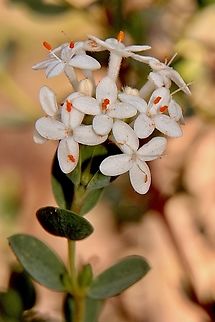
Appearance
"Pimelea humilis" is an erect or scrambling that typically grows to a height of 5–50 cm and has densely hairy young stems. Its leaves are arranged in opposite pairs, narrowly elliptic to lance-shaped, mostly 5–16 mm long, 1–9 mm wide on a short petiole. The flowers are arranged in clusters of 12 to 52 on a peduncle 2–19 mm long, surrounded by 4 or 6 egg-shaped involucral bracts 6–18 mm long, 3–11 mm wide and green with a yellow base. The flowers are creamy-white, the flower tube 8–15 mm long, the sepals 1–5 mm long, and the stamens shorter than the sepals. Flowering occurs from September to December and the fruit is green and about 4 mm long.Common riceflower is similar to "P. linifolia" but is smaller, softer and has hairy stems.
Distribution
Common riceflower grows in heath, woodland, forest and grassland, often in sandy soil. It is widespread and common in Victoria, but less common in New South Wales, growing at Robertson and south of Eden. It also occurs east of the Mount Lofty Range in South Australia and in north-eastern Tasmania.References:
Some text fragments are auto parsed from Wikipedia.